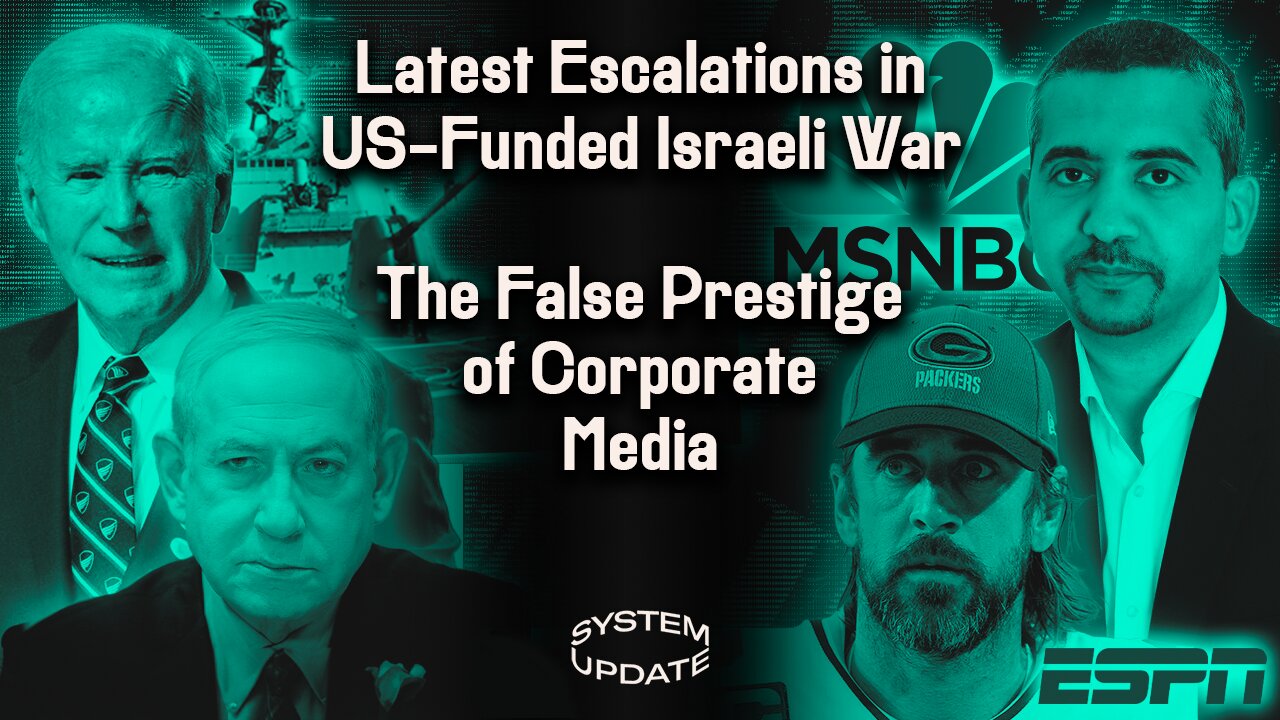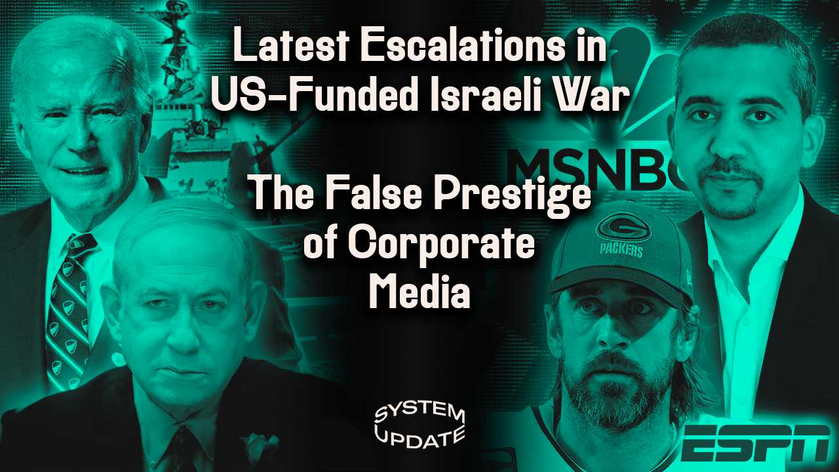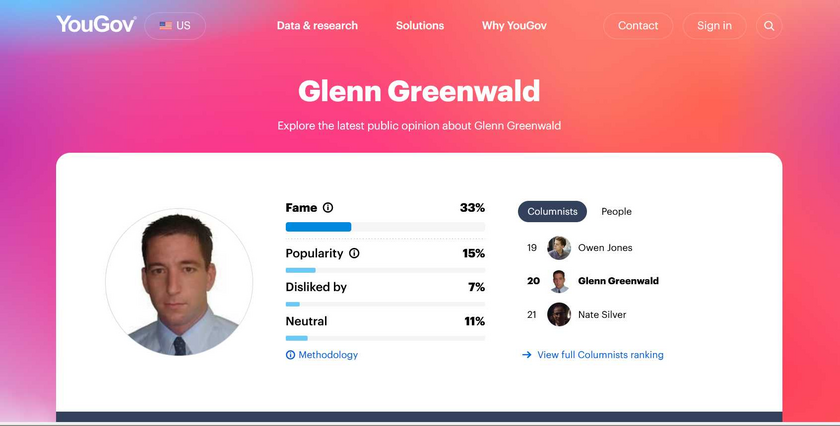Watch the full episode here:

Good evening. It's Wednesday, January 10th.
Tonight: the U.S.-funded War in the Middle East continues to escalate in very serious and potentially unpredictable ways. Both U.S. and British forces once again engaged Yemeni fighters in the Red Sea, intercepting what The New York Times called today “one of the largest barrages yet of drones and missiles fired from Houthi-controlled areas of Yemen.” It is not hyperbole to say that this is quickly turning into a third war, in which the Biden presidency has involved the United States first in the proxy war against Russia and Ukraine, then the U.S.-armed-and-funded Israeli destruction of Gaza and now this increasingly intense military engagement with the Houthi militia in Yemen.
More escalation from the Israel-Gaza war is quite possible. One might even say likely, particularly with the ongoing exchange of bombs on a daily basis now between Israel and Hezbollah, in Lebanon and northern Israel. The Iraqi government, at least publicly, is demanding the U.S. leave its country, furious over a drone attack near Baghdad. Israel continues at will to bomb Syria, where the United States—for reasons nobody will explain—continues to have bases despite the Syrian government wanting those bases gone.
The backdrop for all of this is that from the start of the October 7 attack on Israel by Hamas, the United States decided to treat this war the way it treated the Russian invasion of Ukraine, not as a war between foreign countries on the other side of the world, but as an American war. As a result, every escalation risk in that region is by definition an escalation risk for the United States, a country that is already involved in fighting in that region with no congressional approval of any kind, which is to say, illegally and unconstitutionally.
All of this takes place as the destruction of civilian life in Gaza by the Israeli military reaches all new levels of historic horrors. Even the Israeli media is now escalating their rhetoric about the horrors that are taking place in Gaza on a virtually unprecedented scale, at least for modern warfare. While Americans were told by their media from the start that the purpose of the Israeli war in Gaza was very specific and focused, namely, to “destroy Hamas,” Israeli officials, when speaking in Hebrew, continue to admit that their war aim is something altogether different and much more expansive, namely, after killing more and more Gazan civilians to make life in Gaza so uninhabitable for human beings that they are forced to leave that area so that Israel can then annex it, reconstruct it, and make it its own. That is what the United States is paying for— an Israeli war not to “destroy Hamas,” but to ethnically cleanse Gaza to take that land that nobody in the world recognizes as belonging to Israel. Israeli officials just now say this with great regularity.
At the same time, the Anti-Defamation League today released a new report that purported to once again prove that there is a grave crisis in the United States of exploding bigotry, namely anti-Semitism. Yet an analysis of that report shows that the ADL, to accomplish that outcome, is counting as “anti-Semitic acts,” any rallies or any protests that include opposition to Israeli action in Gaza or a defense of the Palestinian cause whether or not such protests feature any expression of hostility against Jews at all.
In sum, all of this is becoming the single most consequential and the costliest foreign policy of the Biden administration, even more so than the two-year-long proxy war against Russia in Ukraine, one that has not only placed the United States squarely on the side of Gaza's destruction, but also one that is risking a serious expansion of that conflict, and most importantly, one that, by design, is continuing to transform the foundational rights and political framework of the United States and Americans here at home. There is no excess of coverage possible for a conflict of this significance, and we'll examine all of these latest developments.
Then: two interesting media controversies have exploded into public view this week, though very different at first glance, both speak volumes about the rapid and glorious collapse of corporate media influence. One involves the former NFL punter Pat McAfee, who built his own massive online following of young sports fans at the same time that Disney-owned ESPN has been bleeding those kinds of viewers. That caused ESPN to pay McAfee $85 million to move his independent show to ESPN.
This week, McAfee publicly attacked one of ESPN's most influential and powerful executives in the harshest way imaginable. Only for ESPN, despite a history of severely punishing any employees who speak ill of other employees do nothing about it because they realize it is McAfee and not ESPN or Disney who have all the leverage.
Meanwhile, at MSNBC, Mehdi Hasan first had his weekend show, which also appeared on the streaming service Peacock—probably none of you have heard of it, barely anybody watched it, but he did have a daily show on Peacock, yet a Saturday night show on MSNBC and that show got canceled within the last couple of months. And then Mehdi Hasan announced this week that either voluntarily or because he's being forced to, he's leaving the network altogether under circumstances that almost every commentator speaking about this departure has simply assumed was caused by Mehdi Hasan’s harsh and vocal criticisms of the Israeli government and his particularly acrimonious questioning of a top Israeli official—something that, according to his defenders, is not permitted at MSNBC.
While many of his supporters in the media assert definitively that this was the cause of his cancellation and of his ultimate ouster from MSNBC, Hasan himself has notably remained very meek and very quiet about the entire episode, never once complaining about MSNBC's restrictions on him. In fact, to the contrary, to the extent that Hasan has expressed his views about any of this at all, he has heaped praise on the network that, according to his own supporters, has unjustly canceled him.
Both of these episodes say a great deal about the serious constraints that exist inside corporate media outlets, restraints that anyone wishing to work inside of these corporations must obey, but it also says a lot—and I think this is very positive—about the rising power and influence of independent media and how those who attract their own audience, independent of corporate and legacy branding, are starting to wield more and more power in the media landscape. We'll examine both stories to highlight what they reveal about the state of both corporate media and independent media.
As viewers of this show know, there are a few causes that I think are more important than building up truly independent media, independent media that can both exist independent of the constraints imposed by corporate media, but at the same time can have a great consequence by reaching a larger and larger audience. One of the prerequisites for that is the preservation of free speech on the internet, which is why that is our top cause but there are a lot of interesting developments rapidly unfolding that show the real power and potential of independent media to subvert the orthodoxies and pieties of corporate media. And I think both of these episodes in different ways illustrate that. So, we want to take a look at each.
For now, welcome to a new episode of System Update, starting right now.

























